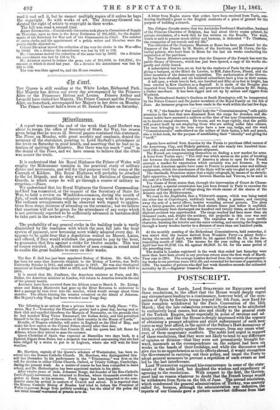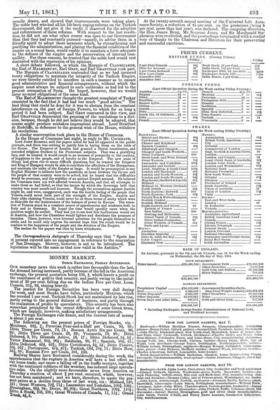POSTSCRIPT.
IN the House of Lords, Lord STRANFORD DE REDELIVER moved three resolutions, to the effect that the House would deeply regret any circumstance leading to a continuance, however brief, of the occu- pation of Syria by foreign troops beyond the 5th June, now fixed for their complete withdrawal by the Paris Convention of the 15th March ; that the late calamitous events in Syria were to be attributed to exclusively local causes, but also and chiefly to the general state of the Turkish Empire, more especially in point of revenue and ad- ministration; and that the House is deeply impressed with the urgency of obtaining a prompt adoption and strict enforcement of such mea- sures as may best afford, in the spirit of the Sultan's Hatt-humayoun of 1856, a reliable security against the recurrence, from any cause what- ever, of these sanguinary conflicts. The noble lord urged in support of these resolutions, that they were not likely to tend to any difference of opinion or division—that they were not prematurely brought for- ward, inasmuch as the correspondence on the subject had been six weeks in the hands of their lordships, and while the discussion need give rise to no apprehension as to its effects abro4 it would strengthen the Government in carrying out their policy, and impel the Porte to adopt general measures to prevent a repetition of such events as bad led to the last interference. Lord WODEHOIME expressed his, concurrence in some of the state- ments of the noble lord, but doubted the wisdom and expediency of agreeing to the resolutions. With respect to the first, the Govern- ment had no reason whatever to doubt that the French troops would be withdrawn from Syria on the 5th of June. The second resolution, which condemned the general administration of Turkey, was scarcely called for, because, although the administration was defective, the reports of our Consuls gave a picture somewhat different from that
usually drawn, and showed that improvements were taking place. The noble lord who had all his life been urging reforms on the Turkish Government, did not give it the credit it deserved for the adoption and enforcement of these reforms. With respect to the last resolu- tion, he did not see what other course was open to our Government than that they had constantly pursued-namely, to advise them in a friendly spirit to adopt those measures which, by strengthening and purifying the administration, and placing the financial condition of the empire on a sound basis, would enable it to maintain a force adequate to the defence of the empire and the preservation of internal tran- quillity. For these reasons, he trusted that the noble lord would rest contented with the repression of his opinions.
A short debate follOwek in which the Marquis of CLANRICARDE, the Earl of M At.wysistray, Earl GREY, and Earl GRANVILLE took part. The Marquis of CLANRICA.RDE contended that as we had incurred treaty obligations to maintain the integrity of the Turkish Empire, we were thereby entitled to interfere in such a manner as to ensure good administrative and financial arrangements, without which the empire must always be subject to such outbreaks as had led to the present occupation of Syria. He hoped, however, that we would incur no more obligations of the same kind. The Earl of MALmESBURY thought the greatest complaint of Turkey consisted in the fact that it had had too much "good advice." The best thing that could be done for it was to abstain from the constant interference on the part of foreign Powers, to which for so long a period it had been subject. Earl GREY concurred in this view, and Earl GRANVILLE deprecated the pressing of the resolutions to a divi- sion, because, though he did not believe they would be adopted, that course might produce mistaken impressions abroad. Lord Stratford de Redcliffe, deference to the general wish of the House, withdrew his resolutions.
A similar conversation took place in the House of Commons.
In the House of Commons last night, in reply to Mr. COCHRANE, Lord Joint RIIEKIET.L said the papers asked for had all appeared in the public journals, and there was nothing to justify him in laying them on the table of the House. The Emperor of Austria had granted a liberal constitution, and conceded religious freedom to his Protestant subjects. That was a gratifying fact, and he trusted it would result in an increase of prosperity to the country, of happiness to the people, and of loyalty to the Emperor. The new state of things had given rise to many difficult questions, but he trusted the Emperor and King of Hungary would be able to conciliate the affections of the Hungarians, and maintain the unity of the Empire at large. It would be presumption in any English Minister to indicate how the questions at issue between the throne and the people of that country were to be solved, but he hoped that the difficulties would be overcome, and the stability of an ancient Empire secured. He believed the Venetians were not well affected towards Austria, and that all attempts to make them so had failed, so that the tenure by which the Sovereign held that country was most unsafe and insecure. Though the accusations against Austria might country and were, exaggerated, such was the hostile feeling of the people that Venetia could never form part of the strength of the Empire. Austria and Italy alike claiming Venetia, could never be on those terms of amity which were so desirable for the maintenance of the balance of power in Europe. The reten- tion of Venetia must be a constant source of apprehension and weakness both to Italy and to Germany. He hoped the time would speedily come when the question might be settled. They had yet to see how free institutions would act in Austria' and how the Chambers would lighten and distribute the pressure of taxation. There, however, were internal questions for the people themselves to settle, and he could only express his earnest hope that the result would be to
conduce to the happiness of the people and the devotion of the Empire. • The motion for the papers was then by leave withdrawn.































 Previous page
Previous page